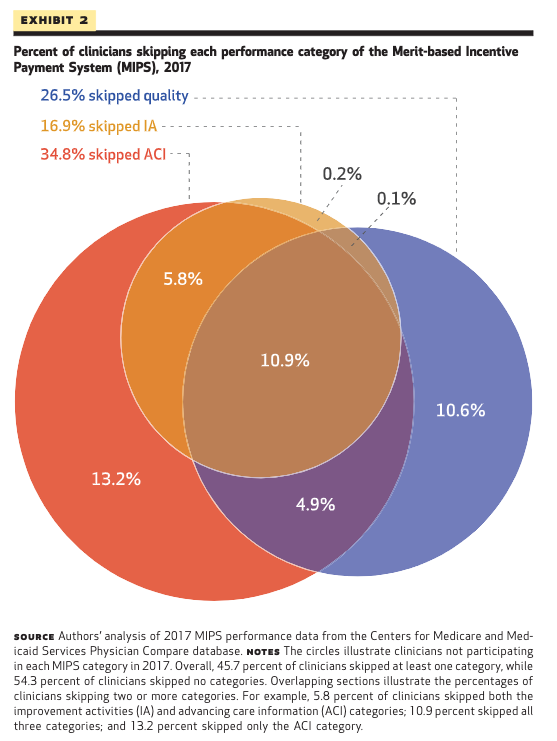New paper thread! 1/9
Great MIPS coverage in this month's @Health_Affairs, although I'm biased towards this paper by me and @JB_Everson examining rates of partial participation in 2017.
https://www.healthaffairs.org/doi/10.1377/hlthaff.2019.01648
Great MIPS coverage in this month's @Health_Affairs, although I'm biased towards this paper by me and @JB_Everson examining rates of partial participation in 2017.
https://www.healthaffairs.org/doi/10.1377/hlthaff.2019.01648
MIPS was a combination of existing quality reporting programs, to make reporting more efficient for providers. The point was not to relax any of these programs, but rather to align them.
More MIPS papers here:
https://twitter.com/wschpero/status/1303434162259591170?s=20
2/9
More MIPS papers here:
https://twitter.com/wschpero/status/1303434162259591170?s=20
2/9
The first year of MIPS was intended to be pretty easy for providers: it excluded cost measures and set a low bar for success at 3 out of 100 possible points. Providers could score higher & get a larger pay bump; that maxed out at 1.88%.
More here:
https://www.healthaffairs.org/do/10.1377/hblog20181026.940799/full/
3/9
More here:
https://www.healthaffairs.org/do/10.1377/hblog20181026.940799/full/
3/9
The program sought to preserve provider incentives to progress across all dimensions of MIPS (quality, improvement activities, & technology in 2017). However, we found that 46% of providers skipped reporting at least one category entirely in 2017.
4/9
4/9
This is not to be confused with exemptions, which would lead a provider score to be "reweighted." This is the quality program equivalent of "taking a zero on the exam" for quality, improvement activities, &/or advancing care information.
5/9
5/9
Still, 74% of these partial MIPS participants got positive payment adjustments, and 19% of those providers got *bonus* payments for their (incomplete) MIPS efforts.
6/9
6/9
Not that MIPS reporting was an easy process for providers, many of whom reported high perceived costs of participation in the admittedly complex program.
https://www.healthaffairs.org/doi/10.1377/hlthaff.2017.1485
7/9
https://www.healthaffairs.org/doi/10.1377/hlthaff.2017.1485
7/9
The major takeaways are 1) high composite scores on MIPS can mask precisely how those scores were constructed for each provider; those details can reveal gaps in participation across categories.
8/9
8/9
And 2) Partial participation is problematic not just because of the added cost to CMS, but also because without incremental improvements providers are less likely to be prepared for increasingly difficult requirements in later years.
Link to paper: https://www.healthaffairs.org/doi/10.1377/hlthaff.2019.01648
9/9
Link to paper: https://www.healthaffairs.org/doi/10.1377/hlthaff.2019.01648
9/9

 Read on Twitter
Read on Twitter


